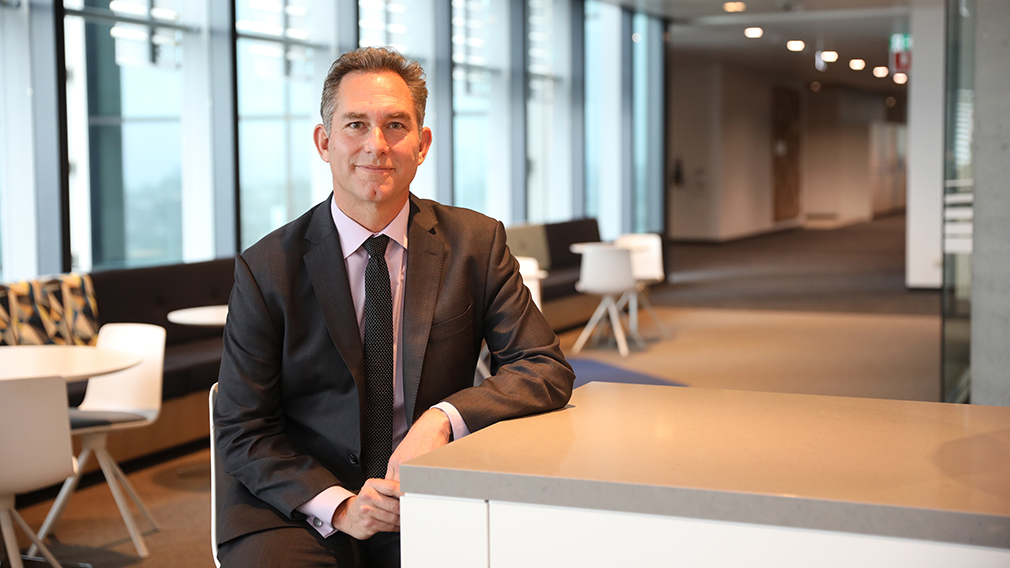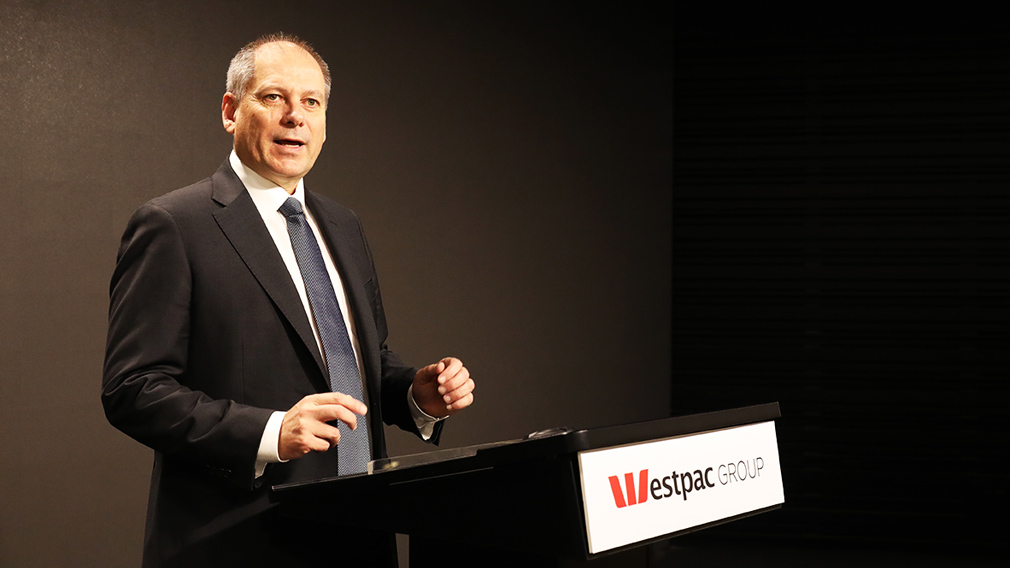‘All options on the table’: Yetton kicks off review

Jason Yetton, the Chief Executive of Westpac’s new Specialist Businesses division. (Emma Foster)
It was 1992 and Australia was suffering a painful recession that was wreaking havoc on the banking system.
Despite the sputtering economy and high unemployment, Jason Yetton managed to secure a graduate job at BT Financial, then part of the renowned institution Bankers Trust Australia, after completing a commerce degree at the University of New South Wales. Within months, BT took part in Westpac’s historic August 1992 capital raising priced at $3 a share to shore up its balance sheet amid souring commercial property exposures.
Almost 30 years later, Yetton’s long association with Westpac – which in 2002 bought Bankers Trust’s local asset management division – continues as Australia stares down its first recession since.
“I was very young as a university graduate in that early 1990s recession starting as a graduate management trainee and I guess you do get shaped a bit by that, but also the other crises since,” says Yetton, who today re-joins Westpac to lead the bank’s new Specialist Businesses division.
“One of the things you learn over time is that cycles always happen and that while each crisis is always different, there’s equally some similarities. So, this downturn will be different because it’s not caused by any obvious economic issue we’ve seen in past crises.
“It’s the consequence of a health crisis. So, the challenge is, having seen the unemployment numbers last week, how do you restart the economy in a safe way? And to some degree that’s untested waters, which means we’re going to have to be really flexible and agile and adjust to the circumstances and facts.
“But the good thing we know about cycles is that in time things do improve and I think if you look at the response from all participants – the government, the RBA, the banks and of course the general population – it’s been a pretty impressive coordinated response.”
Amidst the unfolding COVID-19 economic drama, Yetton today officially begins his new role as Chief Executive of the Specialist Businesses division, which houses the group’s Superannuation, Platforms, Investments, Insurance, Auto Finance and Westpac Pacific businesses that the bank this month said would be subject to a strategic review. Combined, they generated around 10 per cent of Group revenue in full-year 2019 and absorb around $4 billion of regulatory capital, at a time when capital is highly valued by banks to support customers and the economy through the COVID-19 pandemic.
In his first comments since starting his role, Yetton says while each business has strong market positions, long histories and deep customer relationships, the review would look at what each requires in coming years and “whether ultimately they might be better served by being in external ownership to continue their investment path and deliver for customers”.
“The strategic review will consider all options and nothing can be ruled out, but it’s in the context of looking at each particular business and what is best suited,” he says when asked if there was any early thinking around sales, demergers or spin-offs.
“There are no set dates. But the review is not an activity that takes days or weeks, it’s actually a process that will require thoughtful analysis and consideration because each of these businesses is significant and has to be looked at differently and each of the opportunities we might contemplate is different.
“And then after that, if one of the outcomes was to look at external ownership, then that’s another process itself both transactionally and in separation.”
Continuing the exit by banks from wealth management in recent years, Commonwealth Bank last week unveiled a deal to sell 55 per cent of its Colonial First State business to global investment giant KKR at a sale price multiple of 15.5 times pro forma net profit after tax.
Yetton says the deal “bodes well” for the industry given the challenges from COVID-19.
“It does show for the sector that there is interest and interest at a reasonable value, which means there’s options for equivalent businesses out there,” he says.
Yetton, Westpac’s Group Executive, Retail & Business Banking from 2011 to 2015, returns to the fold after five years in senior roles across fintech and banking, including CEO of Australia’s largest peer-to-peer lender, SocietyOne and leading CBA’s wealth management and mortgage broking businesses, dubbed NewCo.
His journey full circle began when CBA paused NewCo’s planned demerger last year, ultimately resulting in Yetton departing in January for three months of gardening leave, much of which was spent considering options in lockdown at his Sydney home with his wife and three sons.
“It was a little different, but it was still good to have a break,” he says.
A few months on, Yetton says while he could have never predicted returning to Westpac in these circumstances, “sometimes the serendipity of life lets you be able to contemplate opportunities you wouldn’t have imagined”.
“It’s actually a nice mix of familiarity, some newness, clearly a lot of challenges but also some new opportunities that come with that too,” he says about returning to the bank. “After leaving CBA, I felt that if the Westpac Group was going down that path of focusing on core banking, I’d be able to bring a lot my experience in more recent times and also previously with Westpac and BT to be able to help.”
It was this mix of experience across banking and wealth that Mr King called out when announcing Yetton’s appointment as Chief Executive of the Specialist Businesses division earlier this month. Analysts welcomed the strategic review, Credit Suisse saying that “focusing and simplifying their business should improve their operational performance and can also provide them with additional capital they can deploy into their more profitable business units”.
“He is well-positioned to help us here,” Mr King said of the appointment at the half-year results earlier this month. “He will lead that business as we run it but he'll also lead the strategic reviews. We haven't made any decisions on timing or what the next steps are, that will come down the track.”
Yetton says while the wealth businesses in the Specialist Businesses division were major players with strong offerings, it was timely to undertake a review given the dynamic environment and importance of the superannuation system to Australians.
Yetton notes that when he started at BT in 1992, superannuation was “relatively small and for relatively few people” until the superannuation guarantee was introduced in the mid-1990s. Today, it has grown to almost $3 trillion with most workers participating in the system. For some Australians, it is even their largest or second largest asset, making it important that the industry finds ways to “cost effectively and compliantly” service customers and help them navigate the complexities of the industry, Yetton says.
“The businesses in these portfolios are important businesses in the context of those industries and therefore it’s important to ensure they’re going to thrive with the right kind of owner and investment to be successful both as organisations but in the context of the public policy good for Australia,” he says.
Looking ahead, Yetton says he remains an optimist and still sees significant opportunities for the nation, citing the massive developments and growth in the past 30 years following the economic reform of the 1980s, the rise of Asia and digitisation of the economy post the internet going mainstream. He says the latter change has arguably been the biggest, recalling how his knowledge of software programs like Lotus 1-2-3 and WordPerfect helped him get the job at BT as the world was just starting to digitise, a trend that has only gotten stronger and which he has gained greater knowledge of while leading fintech SocietyOne.
“Now we’re talking about an entire digital economy … it’s just a complete revolution,” he says.
“So part of the optimism I have is based on my experience that although there’s been swings and roundabouts and good times and bad cycles in that, you look over a 20 or 30 year period and we’re generally in a far better shape economically, socially, globally than was the case back in 1992.”
“We’re in a very fortunate part of the world, a very fortunate country with lots of opportunities. That said, to take advantage of them we’ve got to do them well, to higher expectations from customers and stakeholders and in the context of generally a much more competitive global economy.”


